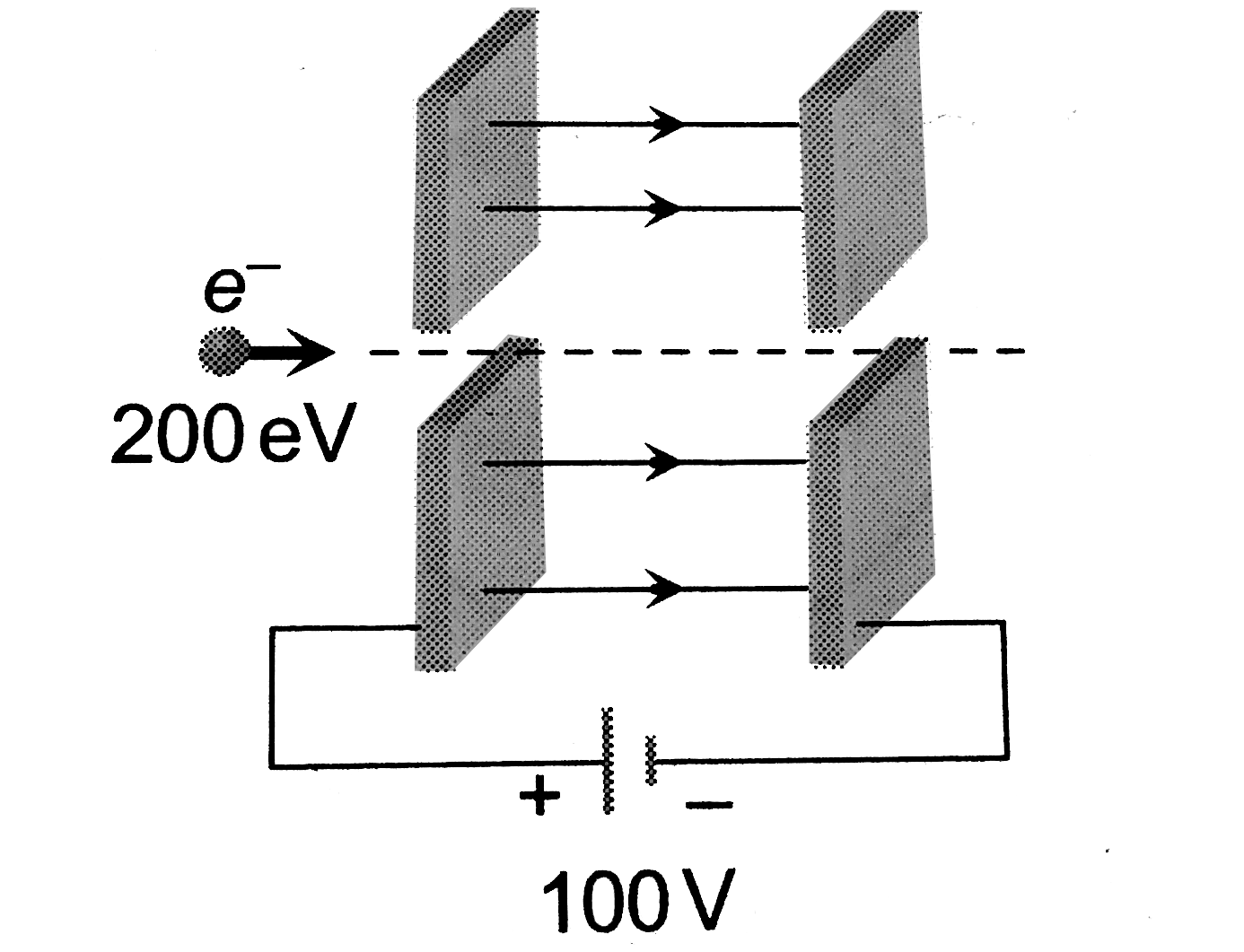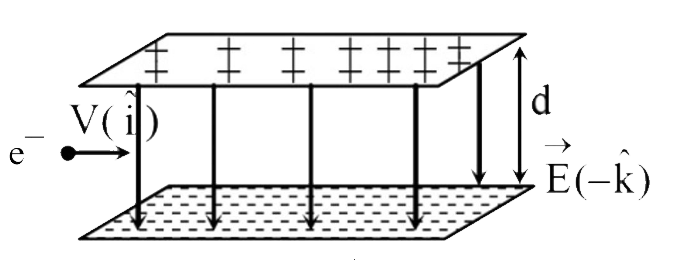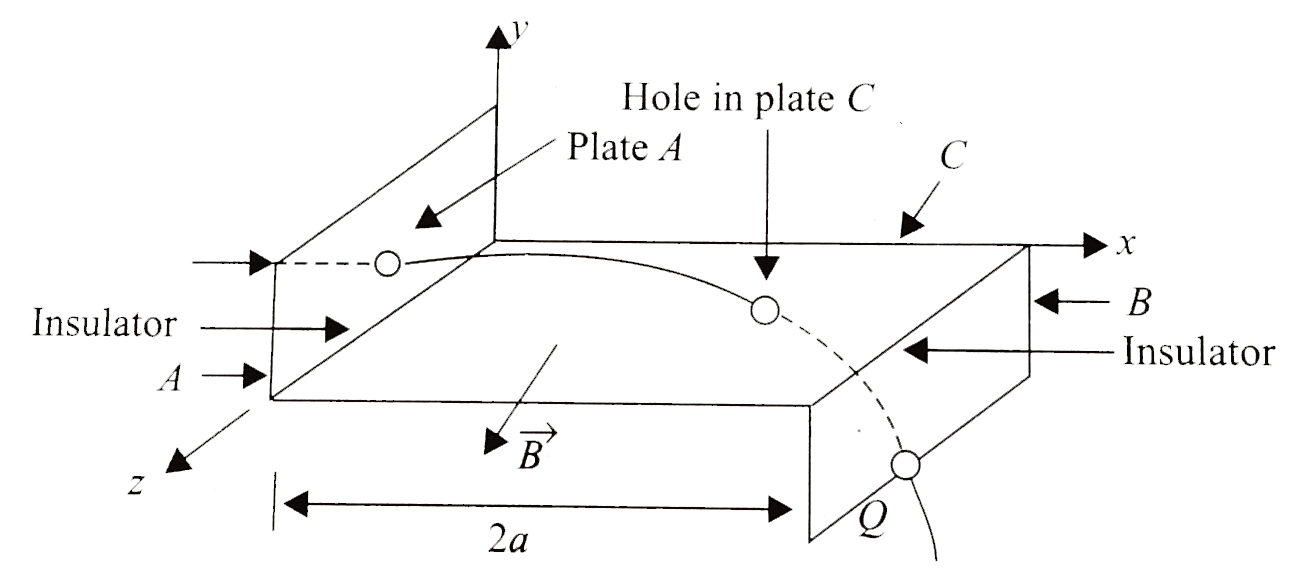Two large parallel plates are connected with the terminal of 100V power supply. These plates have a fine hole at the centre . An electron having energy 200eV is so directed that it passes through the holes . When it comes out its de - Broglie wavelength is

1.22 Å
1.75 Å
2 Å
None of these
The correct Answer is:A
Step by step video, text & image solution for Two large parallel plates are connected with the terminal of 100 V power supply. These plates have a fine hole at the centre . An electron having energy 200 eV is so directed that it passes through the holes . When it comes out its de - Broglie wavelength is by Physics experts to help you in doubts & scoring excellent marks in Class 12 exams.
Updated on:21/07/2023Topper's Solved these Questions
- ELECTRON, PHOTON, PHOTOELECTRIC EFFECT AND X-RAYSBOOK - ERRORLESS CHAPTER - ELECTRON, PHOTON, PHOTOELECTRIC EFFECT AND X-RAYSEXERCISE - Cathode Rays and Positive Rays
11 Videos
- ELECTRON, PHOTON, PHOTOELECTRIC EFFECT AND X-RAYSBOOK - ERRORLESS CHAPTER - ELECTRON, PHOTON, PHOTOELECTRIC EFFECT AND X-RAYSEXERCISE - Photon and Photoelectric Effect
4 Videos
- ELECTRO MAGNETIC INDUCTIONBOOK - ERRORLESS CHAPTER - ELECTRO MAGNETIC INDUCTIONEXERCISE - SET
20 Videos
- ELECTRONICSBOOK - ERRORLESS CHAPTER - ELECTRONICSEXERCISE - Selv Evaluation Test
23 Videos
Similar Questions
A photon and an electron have energy 200 eV each. Which one of these has greater de-Broglie wavelength ?
View SolutionThe distance between the two plates of a cathode-ray oscilloscope is 1 cm and the potential difference between them is 1200 V. If an electron of energy 2000 eV enters at right angles to the field, what will be its deflection if the plate be 1.5 cm long.
View Solution
Knowledge Check
An electron is having a kinetic energy of 50 eV. Its de-Broglie wavelength is
A1.737ÅB2.5ÅC4.414ÅD6.5ÅAn electron is having a kinetic energy of 50 eV. Its de broglie wavelength is
A1.732 ÅB2.5 ÅC4.414 ÅD6.5 ÅThe two parallel plates of a condenser have been connected to a battery of 300 V and the charge collected at each plate is 1μC. The energy supplied by battery is :
A6×10−4JB3×10−4JC1.5×10−4JD4.5×10−4J
The plates of a parallel plate capacitor have an area of 100cm2 each and area separated by 2.5 mm. the capacitor is charged to 200V. Calculate the energy stored in the capacitor.
View SolutionA problem of practical interest is to make a beam of electrons turn through 90∘. This can be done with the parallel plates shown in the figure. An electron with kinetic energy 8.0×10−17J center through a small hole in the bottom plate. The strength of electric field that is needed if the electron is to emerge from an exit hole 1.0cm away from the entrance hole, traveling at right angle to its original direction is _______________ ×105 N/C.
'(##CEN_KSR_PHY_JEE_C18_E01_034_Q19##)'
View SolutionThe parallel plate capacitor has potential difference of 100 V and separation between the plate is 1 mm. An electron is projected along x axis in between the plates. If the electron comes out of the plates along the x axis undevated then the magnitude and direction of magnetic field that must be applied between the plates : (particle is projected with a velocity of 105m/s along x axis)

View SolutionA cathode ray tube contains a pair of parallel metal plates 1.0cm apart and 3.0cm long. A narrow horizontal beam of electron with a velocity of 3×107ms−1 is passed down the tube midway between the two plates. When a potential difference of 550V is maintained across the plates, it is found that the electron beam is so deflected that it just strikes the end of one of the plates. then the specific change of an electron (that is, the ratio of its charge to mass) in C/kg is :
View SolutionTwo recangular plates A and B placed at a distance 2a apart, are connected to a battery to produce an electric field. There are insulators between plantes C and other two plates. A magnetic field exists along z-axis. A charged particle of mass m and charge q passes through a hole at the middle of the plate A with velocity v and strikes at Q which is the middle of the bottom edge of plate B after passing through a hole inplate C. If E=mv2/qa, what will be the speed of the particle at Q?

View Solution
